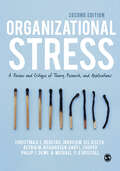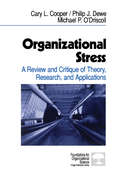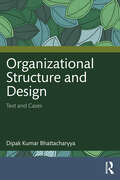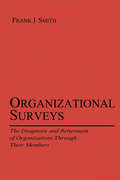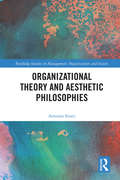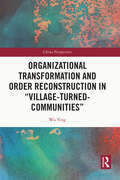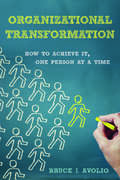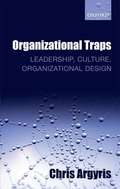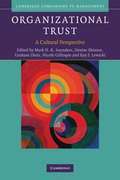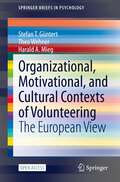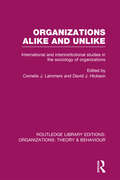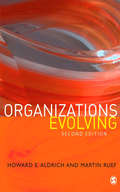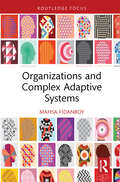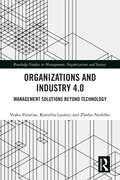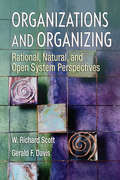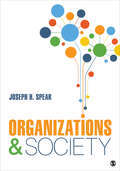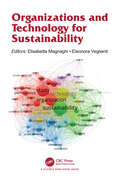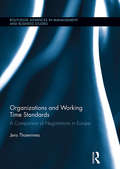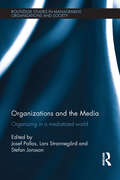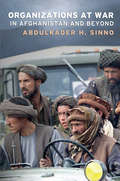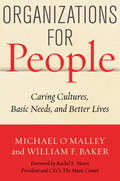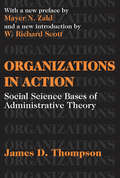- Table View
- List View
Organizational Stress: A Review and Critique of Theory, Research, and Applications
by Cary L. Cooper Philip J. Dewe Christina G. Nerstad Ingvild M. Seljeseth Astrid M Richardsen Michael P O′DriscollWhat price do organizations and nations pay for a poor fit between employees and their work environments? Negative stress imposes a high cost on individual health and well-being as well as organizational health and productivity. This comprehensive textbook examines the definitions of job-related stress and the methods used to assess levels and consequences of occupational stress, along with strategies that may be used by individuals and organizations to confront negative stress and its associated problems. From sources of stress to organizational interventions, and from job-related burnout to coping with stress, Organizational Stress gives the reader – whether researcher, student, or practitioner – a basis for tailoring work environments which contribute to the health and well-being of individuals, organizations, and even the societies in which they live. This new edition has been updated to reflect the most relevant research in the field of organisational stress, including a completely new chapter on stress and the brain. It also focusses on the future of work in our rapidly changing world – dealing with contemporary contexts such as the COVID-19 pandemic and the rise of the gig economy. Christina G.L. Nerstad is a Professor at BI Norwegian Business School Ingvild M. Seljeseth is an Associate Professor at Kristiania University College Astrid M. Richardsen is Professor Emerita at BI Norwegian Business School Cary L Cooper is a Professor at Alliance Manchester Business School Philip J. Dewe is Emeritus Professor at Birkbeck, University of London Michael P. O′Driscoll is Emeritus Professor at University of Waikato
Organizational Stress: A Review and Critique of Theory, Research, and Applications
by Cary L. Cooper Philip J. Dewe Christina G. Nerstad Ingvild M. Seljeseth Astrid M Richardsen Michael P O′DriscollWhat price do organizations and nations pay for a poor fit between employees and their work environments? Negative stress imposes a high cost on individual health and well-being as well as organizational health and productivity. This comprehensive textbook examines the definitions of job-related stress and the methods used to assess levels and consequences of occupational stress, along with strategies that may be used by individuals and organizations to confront negative stress and its associated problems. From sources of stress to organizational interventions, and from job-related burnout to coping with stress, Organizational Stress gives the reader – whether researcher, student, or practitioner – a basis for tailoring work environments which contribute to the health and well-being of individuals, organizations, and even the societies in which they live. This new edition has been updated to reflect the most relevant research in the field of organisational stress, including a completely new chapter on stress and the brain. It also focusses on the future of work in our rapidly changing world – dealing with contemporary contexts such as the COVID-19 pandemic and the rise of the gig economy. Christina G.L. Nerstad is a Professor at BI Norwegian Business School Ingvild M. Seljeseth is an Associate Professor at Kristiania University College Astrid M. Richardsen is Professor Emerita at BI Norwegian Business School Cary L Cooper is a Professor at Alliance Manchester Business School Philip J. Dewe is Emeritus Professor at Birkbeck, University of London Michael P. O′Driscoll is Emeritus Professor at University of Waikato
Organizational Stress: A Review and Critique of Theory, Research, and Applications
by Dr Cary P. Cooper Dr Philip J. Dewe Dr Michael P O'DriscollThis book examines stress in organizational contexts. The authors review the sources and outcomes of job-related stress, the methods used to assess levels and consequences of occupational stress, along with the strategies that might be used by individuals and organizations to confront stress and its associated problems. One chapter is devoted to examining an extreme form of occupational stress--burnout, which has been found to have severe consequences for individuals and their organizations. The book closes with a discussion of scenarios for jobs and work in the new millennium, and the potential sources of stress that these scenarios may generate.
Organizational Structure and Design: Text and Cases
by Dipak Kumar BhattacharyyaThis textbook explores major issues and concepts in organizational structure and design. It details strategic and business issues that merit consideration while framing or designing the organizational structure.Working with a range of industry examples and case studies, this volume: Relates organizational structure and design issues with organizational culture and change management, power and politics, and policies and strategies Covers several key topics, including the structure-strategy debate, viable system model, issues pertaining to organizational culture, change management, power, and conflict Discusses various models of organizational structure like matrix, global business unit, strategic business unit, hybrid, functional and divisional, modular, networked, agile, helix, etc., in relation to organizational practices and their strategic influence over the organization Enables readers to challenge organizational design in times of uncertainty Concise, lucid, and engaging, this book will be useful to students, academics, management researchers, and industry professionals in the fields of general management, organizational behaviour, and human resource management and development.
Organizational Surveys: The Diagnosis and Betterment of Organizations Through Their Members (Applied Psychology Series)
by Frank J. SmithSurveys conducted within organizations have become an important aspect of human resource management and organizational functioning. This new book by Frank Smith--a leader in this field--offers a unique perspective on organizational surveys. It emphasizes the experience of developing, carrying out, and interpreting surveys on a wider variety of organizational issues in a very diverse set of organizations. The book is intended to acquaint managers, students, and potential survey users with a broad understanding of the kind of information surveys can provide and how they have been applied in a wide variety of organizational settings. Through many examples, the book emphasizes the close and necessary link between the continual development of a survey program and the parallel body of research in organizational behavior. This book will be of interest to survey practitioners, students, and instructors in human resource management and organizational behavior, and anyone looking for first-hand examples or survey approaches and the links to research and psychometric theory.
Organizational Theory and Aesthetic Philosophies (Routledge Studies in Management, Organizations and Society)
by Antonio StratiDiverse philosophies constitute the theoretical ground of the study of the aesthetic side of organization. In fact, there is not a single unique philosophy behind the organizational research of the aesthetic dimension of organizational life. Organizational Theory and Aesthetic Philosophies will illustrate and discuss this complex phenomenon, and it will be dedicated to highlight the philosophical basis of the study of aesthetics, art and design in organization. The book distinguishes three principal "philosophical sensibilities" amongst these philosophies: aesthetic, hermeneutic and performative philosophical sensibility. Each of them is described and critically assessed through the work of philosophers, art theorists, sociologists and social scientists who represent its main protagonists. In this way, the reader will be conducted through the variety of philosophies that constitute a reference for aesthetics and design in organization. The architecture of the book is articulated in two parts in order to provide student and scholars in philosophical aesthetics, in art, in design and in organization studies with an informative and agile instrument for academic research and study.
Organizational Transformation and Order Reconstruction in "Village-Turned-Communities" (China Perspectives)
by WU YingSince the beginning of the 21st century, a state-led urbanization has evolved into a "city management" in China: a large number of villages were demolished; cultivated land was centralized; and peasants went to live in apartments, which led to the widespread emergence of "village-turned-communities". This title explores the evolving and complex relationship between the urbanization of land and people – two core components of China’s urbanization strategy. What role does the government play in creating conflicts around these two aspects of urbanization? What role can it play in adjudicating them? To answer these questions, the author examines rural migrants’ experience in integrating and being integrated into the cities. Through a three-year investigation in Beijing, Shandong, Wuhan and Yunnan, the author shows how government policies can either engender or mitigate conflicts, as well as identifies integrated governance as an effective approach to urbanization of both land and people. This title is awarded the top ten Chinese sociology books in 2019. Students and scholars of sociology, politics and public administration will benefit from this book.
Organizational Transformation: How to Achieve It, One Person at a Time
by Bruce J. AvolioIt is estimated that approximately seventy percent of organizations fail in their attempts to implement transformative change. This book will help lessen that rate. Using real-world examples, Bruce J. Avolio maps four states of change that any organization must go through: identifying and recognizing, initiating, emerging and impending, and institutionalizing new ways of operating. Each state is described in detail, as are the leadership qualities necessary to solidify and transition from one to the next. These "in-between moments" are an often-overlooked key to organizational transformation. So too is the fact that organizational change happens one individual at a time. For transformation to take root, each person must shift his or her sense of self at work and the role that he or she plays in the transforming organization. Intended as a road map, rather than a "how-to" manual with fixed procedures, Organizational Transformation will help leaders to locate their organization's position on a continuum of progress and confidently navigate planned, whole-systems change, overcoming the challenges of growing from and adjusting to watershed moments.
Organizational Traps: Leadership, Culture, Organizational Design
by Chris ArgyrisThis book argues that whatever theory is used to describe and understand such organizational traps should be used to design and implement interventions that reduce and prevent them. Argyris is one of the world's leading management scholars whose work has consistently shed light on organizational problems. This book is essential reading for MBAs, managers, and consultants.
Organizational Trust: A Cultural Perspective
by Roy J. Lewicki Denise Skinner Graham Dietz Nicole Gillespie Mark N. K. SaundersThe globalized nature of modern organizations presents new and intimidating challenges for effective relationship building. Organizations and their employees are increasingly being asked to manage unfamiliar relationships with unfamiliar parties. These relationships not only involve working across different national cultures, but also dealing with different organizational cultures, different professional cultures and even different internal constituencies. Managing such differences demands trust. This book brings together research findings on organizational trust-building across cultures. Established trust scholars from around the world consider the development and maintenance of trust between, for example, management consultants and their clients, senior international managers from different nationalities, different internal organizational groupings during times of change, international joint ventures, and service suppliers and the local communities they serve. These studies, set in a wide variety of national settings, are an important resource for academics, students and practitioners who wish to know more about the nature of cross-cultural trust-building in organizations.
Organizational, Motivational, and Cultural Contexts of Volunteering: The European View (SpringerBriefs in Psychology)
by Stefan T. Güntert Harald A. Mieg Theo WehnerThis open access book offers a comprehensive view of the phenomenon of volunteer work: it examines motivational factors and questions of corporate organization and the social environment. In particular, this is the first book to present volunteer work in detail as a psychosocial resource and a source of well-being that should not be overused or abused. The book is based on the authors' 15 years of research into volunteer work in Europe. It provides clear instructions on designing volunteer work tasks, and on where boundaries must be respected. The findings include insights into cultural and national differences, and offer practical advice on the organization of volunteer work. This book answers questions like: How do we understand voluntary work? How essential is it that this kind of work remains unpaid and carried out by so-called laypersons with special motives? And what follows from this for the interaction between voluntary work and professionalized, paid employment? The analysis draws on perspectives from wellbeing research, organizational and industrial studies, social work, and related social sciences.
Organizations Alike and Unlike: International and Inter-Institutional Studies in the Sociology of Organizations (Routledge Library Editions: Organizations)
by David J. Hickson Cornelis J. LammersThis volume contrasts the life and problems of organizations in many parts of the world and highlights the differences between those societies as reflected in their different institutional sectors such as manufacturing, commerce, social services and government administration. In so doing, the book contributes to the theoretical foundations of the sociology of organizations by revealing previously unseen relationships between societies and institutions, offering an original synthesis of available research.
Organizations Evolving
by Martin Ruef Howard AldrichA keenly anticipated Second Edition of an award winning classic, Organizations Evolving presents a sophisticated evolutionary view of key organizational paradigms that will give readers a unified understanding of modern organizations. <p><p> This Second Edition is an up-to-date survey of the literature, as well as an overview of the new developments across organization studies. It contains new sections on organizational forms, community evolution and methods for studying organizations at multiple levels. <p> The field of organization studies contains many contending paradigms that often puzzle and perplex students. This book is a stunning synthesis of the major organizational paradigms under the umbrella of organizational theory. Scholars and students will find it an excellent guide to the strengths and weaknesses of the various approaches, as well as an outstanding review of the best recent empirical research on organizations. <p> The book includes many helpful features, such as: <p> - Review questions and exercises that will consolidate reader's learning <p> - A methodological appendix that assesses common research methods <p> - Engaging cases that bring principles and concepts to life <p> This Second Edition is a rich resource for study, discussion and debate amongst organizational scholars and postgraduate students of organizations.
Organizations and Complex Adaptive Systems (Routledge Focus on Business and Management)
by Mahsa FidanboyOrganizations and Complex Adaptive Systems explains complexity theory within the organizational studies and discusses the applicability of complex adaptive systems principles for intraorganizational and interorganizational levels. Complex adaptive systems and complexity theory have been studied in many different fields of science. When studying the application of complex adaptive systems within social sciences, not many are seen in real terms in contrary to the myriads of theories and propositions available. The complex adaptive systems perspective is presented in quantitative terms in natural sciences, but a quantitative approach has not been used within social sciences a lot comparatively. This book links the basics of complex adaptive systems to social sciences, focusing on organizational studies and covering interorganizational, organizational, and individual levels. It shows the latest state of knowledge on the topic and will be of interest to researchers, academics, managers, and students in the fields of management, organizational theory and behavior, and strategic management.
Organizations and Industry 4.0: Management Solutions Beyond Technology (Routledge Studies in Management, Organizations and Society)
by Zlatko Nedelko Vojko Potočan Kornélia LazányiKnown models for assessing the readiness and level of Industry 4.0 implementation are helpful in revealing key technological and non-technological aspects relevant in the frame of Industry 4.0 implementation in organizations. At the forefront are technological aspects of Industry 4.0 implementation in organizations, while non-technological aspects play a marginal role. Building upon ample evidence about the role of non-technological aspects of Industry 4.0 implementation in organizations, this book addresses these ever-important non-technological aspects.The authors address the role of management solutions in the framework of Industry 4.0 implementation through the utilization of various management tools, which support organizations working in all organizational areas. The importance of humans for Industry 4.0 is currently severely neglected, despite the many changes in the workplace. Thus, new challenges for human resource management (HRM) have emerged, such as technostress, human–robot interaction (HRI), and new tasks for employees. Non-technological aspects of Industry 4.0 are broadly influencing entire organizations, as the management tools support the working of organizations in all areas. Focusing on non-technological aspects of Industry 4.0 implementation, this book considers the utilization of traditional management tools as a key vehicle for supporting implementation in organizations. In terms of the importance of humans for implementation, at the forefront are changes in the workplace due to Industry 4.0, HRIs, and changing HRM practices.This book will be of value to researchers, academics, and advanced students in the fields of organizational studies, HRM, and change management.
Organizations and Organizing: Rational, Natural and Open Systems Perspectives
by Gerald F. Davis W Richard ScottFor advanced undergraduate courses on organizations, sociology of organizations, organizations & management, and organization theory. Courses can be found in the departments of sociology, business and public administration departments. Organizations and Organizing: Rational, Natural and Open Systems 1/e, covers the early history of organization studies, provides a comprehensive framework for comparing competing theoretical paradigms, and addresses major developments in the most recent decade. Its scholarly yet accessible conceptual framework encourages our diverse scholarly community to come together to consider common issues and problems.
Organizations and Society
by Joseph H. SpearWhat are the costs and consequences of living in a society that has undergone an "organizational revolution"? To what extent is social life in the 21st century dominated by the rational control that is characteristic of bureaucratic organizations large and small? Organizations and Society addresses these broader human questions with a critical perspective, while at the same time explaining the main concepts and theories in the field. Students of all interests—those who wish to run organizations someday, study them, or simply understand their importance in the contemporary social order—will benefit from the insights and cogent arguments of this text for undergraduate classrooms.
Organizations and Society
by Joseph H. SpearWhat are the costs and consequences of living in a society that has undergone an "organizational revolution"? To what extent is social life in the 21st century dominated by the rational control that is characteristic of bureaucratic organizations large and small? Organizations and Society addresses these broader human questions with a critical perspective, while at the same time explaining the main concepts and theories in the field. Students of all interests—those who wish to run organizations someday, study them, or simply understand their importance in the contemporary social order—will benefit from the insights and cogent arguments of this text for undergraduate classrooms.
Organizations and Technology for Sustainability
by Elisabetta Magnaghi Eleonora VegliantiThis book presents insights on digital transformation with a multidisciplinary lens. Collecting chapters from several management perspectives, it provides perspectives on the role of various concepts and elements that are needed by our organizations to win in today’s competition. This book is a contribution to the organizational, to the information and communication technology (ICT) as well as to the sustainability discussion. Here, the readers can find heterogenous inputs to better understand the organizational and technological aspects considering a sustainable business approach. This book is for academicians, students and practitioners interested in the interplay among IT-based solutions, organizational entities and sustainability issues.
Organizations and Unusual Routines
by Ronald E. Rice Stephen D. CooperEveryone working in organizations will, from time to time, experience frustrations and problems when trying to accomplish tasks that are a required part of their role. In such cases it is normal for people to find ways of completing their work in such a way that they can get around, or just simply avoid, the procedure or system that has caused the problem. This is an unusual routine - a recurrent interaction pattern in which someone encounters a problem when trying to accomplish normal activities by following standard organizational procedures and then becomes enmeshed in wasteful and even harmful subroutines while trying to resolve the initial problem. Using a wide range of case studies and interdisciplinary research, this book gives researchers and practitioners invaluable information on the nature of this pervasive organizational phenomenon and shows how they can be dealt with in order to improve organizational performance.
Organizations and Working Time Standards: A Comparison of Negotiations in Europe (Routledge Advances in Management and Business Studies #54)
by Jens ThoemmesCollective bargaining between employers and trade unions has profoundly changed working conditions in companies around the globe. But why do we start work at the age of 10, 16, 18 or 24? Why do we work 6, 8, 10 or more hours a day? These questions are becoming increasingly pertinent as working norms are fractured and fragmented by country. This book brings an entirely new perspective to our understanding of changes in working time. In both the UK and the US, effective legal or collectively-bargained regulation of working time has been limited over the last 20 years, to the extent that its disappearance is seen as almost unproblematic. Here author Jens Thoemmes sheds light on this transition and its economic implications with a fully evidenced sociological account, based particularly on original research into cases of working time standards in France and Germany. This book addresses the whole process of working time regulation over the last twenty years, evaluating the activities of trade unions, employers, and the State. While theories of industrial relations have already addressed the issue of markets in the context of collective bargaining, this book draws connections between time and markets, places these transitions in their historical contexts, and illustrates the importance of this movement crossing borders and cultures.
Organizations and the Media: Organizing in a Mediatized World (Routledge Studies in Management, Organizations and Society)
by Stefan Jonsson Josef Pallas Lars StrannegårdThe relationship between media and the organizations they cover has changed dramatically in the last few decades, which have witnessed a huge expansion of news coverage focusing on different types of organizations and their activities. In parallel, organizations have dramatically increased their investment in public relations and other media-oriented forms of communication. Like other societal developments – globalization, marketization, individualization, scientification – mediatization has become an institutional force. This book analyses the mediatization of contemporary organizations and how individual organizations, industry or markets are scrutinized. It examines its key influence on the actions of organizations, and how it shaptes the entire landscape in which the organizations operate. What such a perspective provides is the accentuation of the interplay between organizations and different parts of the society as embedded in the media and its logic. This will be essential reading for professionals, academics and advanced students in organizational studies, public relations and media studies.
Organizations at War in Afghanistan and Beyond
by Abdulkader H. SinnoWhile popular accounts of warfare, particularly of nontraditional conflicts such as guerrilla wars and insurgencies, favor the roles of leaders or ideology, social-scientific analyses of these wars focus on aggregate categories such as ethnic groups, religious affiliations, socioeconomic classes, or civilizations. Challenging these constructions, Abdulkader H. Sinno closely examines the fortunes of the various factions in Afghanistan, including the mujahideen and the Taliban, that have been fighting each other and foreign armies since the 1979 Soviet invasion. Focusing on the organization of the combatants, Sinno offers a new understanding of the course and outcome of such conflicts. Employing a wide range of sources, including his own fieldwork in Afghanistan and statistical data on conflicts across the region, Sinno contends that in Afghanistan, the groups that have outperformed and outlasted their opponents have done so because of their successful organization. Each organization's ability to mobilize effectively, execute strategy, coordinate efforts, manage disunity, and process information depends on how well its structure matches its ability to keep its rivals at bay. Centralized organizations, Sinno finds, are generally more effective than noncentralized ones, but noncentralized ones are more resilient absent a safe haven. Sinno's organizational theory explains otherwise puzzling behavior found in group conflicts: the longevity of unpopular regimes, the demise of popular movements, and efforts of those who share a common cause to undermine their ideological or ethnic kin. The author argues that the organizational theory applies not only to Afghanistan-where he doubts the effectiveness of American state-building efforts--but also to other ethnic, revolutionary, independence, and secessionist conflicts in North Africa, the Middle East, and beyond.
Organizations for People: Caring Cultures, Basic Needs, and Better Lives
by Michael O'Malley William F. BakerFor many years, there has been quite a bit of talk about employee engagement as a means to lift corporate profits and reduce absenteeism and turnover. However, this talk has not produced better companies. In fact, the evidence shows that incivility and instances of employee abuse are getting worse. Additionally, with profit as the primary goal of organizations, most employees view any benign treatment they receive as a secondary convenience that will dissipate once corporate fortunes decline. That is, many employees still believe they are expendable in the eyes of their employers. This book turns that equation around by examining the practices of twenty-one companies that put the interests and needs of employees first. Profits are necessary but insufficient for corporate health. The companies featured in this book see it as their mission to offer people a better, more fulfilling life for themselves, and assist with that holistic journey by providing the organizational elements people need to reach their potential. They do this first by creating respectful and kind cultures that treat every person as an equal, sentient partner in the success of the company. Second, they diligently work to satisfy people's basic needs: financial security, belonging, meaning, autonomy, self-acceptance, self-confidence, and growth. The result is a web of fellow-feeling: earnest affection among people who feverishly work to live up to both the high standards of the institution and their obligations to one another. By providing a place where people can do their best work and thrive as individuals and as members of a cohesive community, everyone profits.
Organizations in Action: Social Science Bases of Administrative Theory (Classics In Organization And Management Ser.)
by James D. ThompsonOrganizations act, but what determines how and when they will act? There is precedent for believing that the organization is but an extension of one or a few people, but this is a deceptively simplified approach and, in reality, makes any generalization in organizational theory enormously difficult. Modern-day organizations manufacturing firms, hospitals, schools, armies, community agencies are extremely complex in nature, and several strategies, employing a variety of disciplines, are needed to gain a proper understanding of them.Organizations in Action is a classic multidisciplinary study of the behavior of complex organizations as entities. Previous books on the subject focused on the behavior of people in organizational contexts, but this volume considers individual behavior only to the extent that it helps explain the nature of organizations. James D. Thompson offers ninety-five distinct propositions about the behavior of organizations, all relevant regardless of the culture in which they are found. Thompson classifies organizations according to their technologies and environments. That organizations must meet and handle uncertainty is central to his thesis.Organizations in Action is firmly grounded in concepts and theories in the social and behavioral sciences. While it does not offer an actual theory of administration, the book successfully extends the scientific base upon which any emerging administrative theory must rest. This classic work is of continuing value to organizational and management specialists, behavioral scientists, sociologists, administrators, and policymakers.
